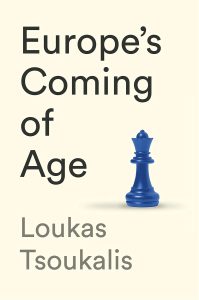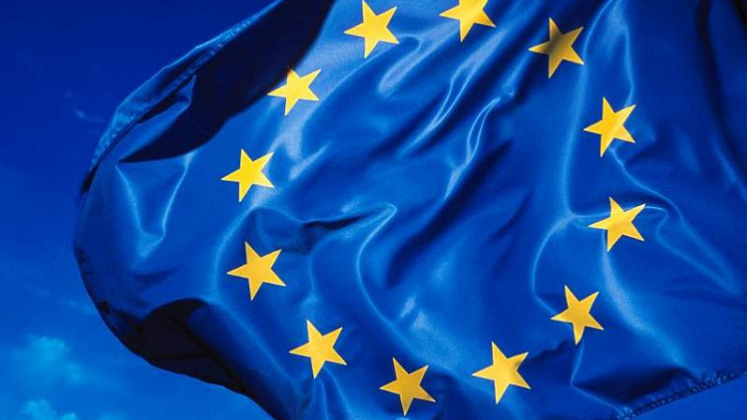In Europe’s Coming of Age, Loukas Tsoukalis considers how the European Union has evolved since its inception and the challenges it faces in this moment of global instability. Traversing issues from migration and economic crises to Brexit and the war in Ukraine, Tsoukalis’s rich analysis will be of interest to anyone concerned with Europe’s history and future, writes Harsh Pandey.
Europe’s Coming of Age. Loukas Tsoukalis. Polity. 2022.
 In the opening section of Four Quartets, T.S. Eliot writes, “What might have been is an abstraction, / Remaining a perpetual possibility / Only in a world of speculation.” These lines might have come to mind for Loukas Tsoukalis while writing Europe’s Coming of Age; when his educational and intellectual journey started the idea of Europe was still in its nascent stage. The author has “lived” the book; as he mentions, it has been a “lifelong affair” for him to understand European unity. Europe is not only the European Union (EU), but for Tsoukalis, the EU takes centre stage.
In the opening section of Four Quartets, T.S. Eliot writes, “What might have been is an abstraction, / Remaining a perpetual possibility / Only in a world of speculation.” These lines might have come to mind for Loukas Tsoukalis while writing Europe’s Coming of Age; when his educational and intellectual journey started the idea of Europe was still in its nascent stage. The author has “lived” the book; as he mentions, it has been a “lifelong affair” for him to understand European unity. Europe is not only the European Union (EU), but for Tsoukalis, the EU takes centre stage.
The thrust of power lies in the Franco-German alliance, which is the brains and brawn of the European integration project
Within the EU, the thrust of power lies in the Franco-German alliance, which is the brains and brawn of the European integration project, along with other important players such as Italy, the Netherlands, and Central and Eastern European states. The talk of non-EU actors comes into the contours of European security, which has been a primary concern for Europe since the beginning of the Russian invasion of Ukraine. Tsoukalis attempts to place the EU and European integration project as a critical factor in the war and how it can define the future of Europe. In the book’s first section, “Extract from a Diary on the European Journey”, his perspective is that of an observer who is also an indirect participant in one of the starting points of the European journey. In the book’s second part, he diagnoses problems and offers solutions for a better EU.
First conceived as a facilitator, [the EU] gradually became a mediator, and now it is working as a regulator for most European states.
The role of the EU has changed in many ways since its inception. First conceived as a facilitator, it gradually became a mediator, and now it is working as a regulator for most European states. It continues to evolve with great speed. The book explores the contours of the changes needed to create a “more assertive” EU, whereby European economic might and the foundations of the cooperation it is built upon can be used to provide its vision of a world where democracy, the rule of law and human rights are at the top of the agenda. Tsoukalis posits that the “idea of Europe” was born out of a Renaissance and Enlightenment ideal to create a sense of community and political cohesion among countries in the region, a unifying ideology later echoed in Churchill’s reference to “the United States of Europe”. Tsoukalis does not argue for abandoning this idea, but rather suggests that it is central to the EU’s positioning. He contends that the “Unipolar Moment” which positioned the US as a sole superpower is long gone. The geopolitical arena is shifting in such a way that major superpowers, the US and China, are at loggerheads. The series of trade wars initiated during the Trump administration worsened the situation for trading powers like the EU.
In the face of this turbulence, Tsoukalis argues, the EU needs to offer the wisdom of its tried-and-tested approach to trade policy: free trade, strong fiscal policy, regulatory mechanisms in the arena of law and order and an ideal whose goal is not mere mercantilism but the growth of humans. It may not go down well with their biggest transatlantic partner, the US. However, the EU knows its constraints, challenges, and possibilities well. The way European institutions function and the level of democracy they maintain despite being an elite-driven and technocentric economic-political project has been one of the EU’s real strengths.
The author dissects key crises faced by the EU, such as the Eurozone economic crisis, the migrant crisis and Brexit, and the resilience it has shown in the aftermath.
The author dissects key crises faced by the EU, such as the Eurozone economic crisis, the migrant crisis and Brexit, and the resilience it has shown in the aftermath. The relatively successful management of those crises and, the outbreak of war following the Russian invasion of Ukraine in February 2022 provide the EU with much-needed impetus for its agency. Before the war began, the EU faced considerable backlash from member states (particularly from the Visegrad group of Czechia, Hungary, Slovakia and Poland) in the management of the migration crisis. However, the war gave these countries a reality check, and the EU umbrella provided them with much-needed support. The European sanctions against Russia have been effective so far. The EU has also managed to avoid the energy crisis, as Russian gas was no longer an option for the European energy basket.
After Brexit, the relationship between the EU and the UK is stabilising, a significant achievement considering the UK’s lost status as the continent’s great power.
At the core of the EU lies the Franco-German alliance. One has the ideas, and the other one can do the work. The author has signified the importance of this alliance and its limitations. Because of its past, Germany is apprehensive towards the word “leadership”. However, France, which has the zeal to provide leadership, is entangled with domestic issues and unable to do as expected. As Tsoukalis suggests, Germany therefore enables France to lead. The other players in Europe are also significant. He argues that after Brexit, the relationship between the EU and the UK is stabilising, a significant achievement considering the UK’s lost status as the continent’s great power. The author sees the other members of the EU, be it the Netherlands, Italy or the new entrants of the Central Eastern European region as all serving a purpose, and no one is thinking of leaving the Union despite their different grievances. If Brexit taught the other EU members one thing, it’s that leaving can be more painful than expected.
In a very lucid, non-EU-specific vocabulary, [the book] analyses the impact of the EU on the life of ordinary Europeans.
A common criticism of the EU as an institution is its opacity. Its institutional mechanisms are tedious, and an ordinary person cannot understand how certain cases and laws impact them. This book attempts to bridge that gap, and in a very lucid, non-EU-specific vocabulary, it analyses the impact of the EU on the life of ordinary Europeans. The EU is a cohort of stable economies forming most of the developed world in terms of their share of global GDP. It is a leader in many areas of legislation, for example, the European Green Deal, the European General Data Protection Regulation or its initial formation a Customs Union. It espouses the ideals of the liberal world order. In the age of neoliberal ascendance, the European welfare system and its stronghold of Social Democratic political parties has kept checks and balances on the market. It has maintained a delicate balance between state and market, unlike the two competing visions at odds in the China-US rivalry.
[The EU] has maintained a delicate balance between state and market, unlike the two competing visions at odds in the China-US rivalry.
As Tsoukalis observes, since the Second World War, Europe has everything except the will to assert and propagate what it has already developed. The continent has achieved a highly advanced degree of economic integration. Most of its states have pooled their sovereignty to achieve stability and prosperity. These factors advance Europe, but it cannot be a sleeping giant. One of the critical thrusts of this work is to argue for a more autonomous Europe. The author suggests that, “history habitually punishes hubris,” and as the world becomes ever more polarised, the EU should focus on protecting what it has achieved so far, such as strong fiscal and monetary policy and free movement of goods and people throughout the continent and the world.
Note: This review gives the views of the author, and not the position of the LSE Review of Books blog, or of the London School of Economics and Political Science. The LSE RB blog may receive a small commission if you choose to make a purchase through the above Amazon affiliate link. This is entirely independent of the coverage of the book on LSE Review of Books.
Image Credit: dominika zara on Shutterstock.







2 Comments